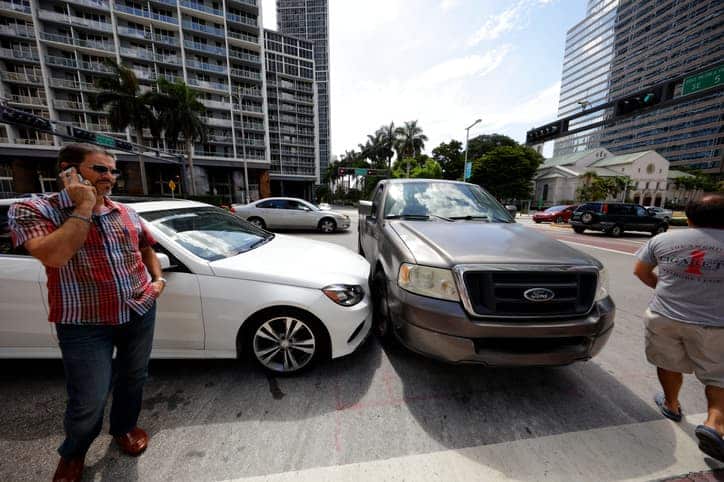What Is Auto Negligence?

If you were involved in an automobile accident caused by another driver’s negligence, you may be entitled to compensation for your medical pain, suffering, property damages, and other losses. Filing an auto negligence lawsuit can help you recover these losses.
At the law offices of Bernstein & Maryanoff Injury Attorneys, our personal injury attorneys are experienced in auto negligence lawsuits and other cases related to automotive accidents.
NO FEES UNLESS WE WIN
Protecting Your Rights Since 1983
Learn about your rights and options and contact our team today for a free consultation on your case.
Hablamos Español
What Is Auto Negligence in Florida
Like many states, Florida allows individuals who suffered harm after an auto accident to bring forward a personal injury lawsuit claiming auto negligence.
In Florida, individuals who are filing a personal injury lawsuit claiming negligence have four years after the date of their accident to bring forward a claim.
In addition to filing within the statute of limitations, it’s important to understand what goes into an auto negligence lawsuit and how you can recover compensation for your injuries. Let’s go over what an auto negligence lawsuit in Florida details and how you can best position yourself for a successful lawsuit.
Understanding Auto Negligence
Auto negligence refers to an automotive accident where you were harmed because of the actions of another driver. The actions of the driver who caused the accident do not have to be intentional in order for a lawsuit to be brought forward.
The number of people who die every year because of car accidents has ticked up over the past couple of years. Automobile accidents are one of the leading causes of preventable death across the nation. According to the latest data from the National Highway Traffic Safety Administration, the year 2020 saw one of the highest rates of automobile accident fatalities, with 38,824 deaths recorded.
After an automobile accident, victims can suffer physical and mental harm. Additionally, expensive medical bills, loss of income, and pain and suffering associated with the accident can make it difficult for victims to move forward with their lives.
Victims of an automobile accident can pursue the compensation they rightly deserve by filing an automotive accident negligence claim. As with most personal injury lawsuits, plaintiffs need to be able to prove negligence. They do this by providing substantial proof supporting their claims.
Common Examples of Auto Negligence
Auto negligence accidents can happen for a variety of reasons. As previously mentioned, negligence can be both intentional and unintentional. Common examples of behaviors that lead to auto negligence include the following:
- Driving distracted is one of the main causes of auto negligence. Distracted driving takes on many forms and includes texting while driving, eating while driving, and any other behaviors that keep your attention off of the road.
- Driving under the influence of alcohol or drugs or otherwise driving impaired
- Driving while tired
- Driving aggressively, including engaging in road rage behaviors.
- Speeding, failing to yield to road signs, and overall reckless driving
- Driving in a vehicle that is not kept in safe working order.
Proving Negligence In An Auto Accident
Proving auto negligence will be the heart of any personal injury lawsuit, including auto accident negligence cases. There are four elements that go into the legal concept of negligence. Plaintiffs
need to be able to prove all four elements in order to have a successful claim. These four elements include the following:
Duty of Care
The defendant owed the plaintiff a duty of care. Essentially, a motorist on the road owes all other motors a duty to drive in a manner that does not pose unreasonable risk or harm. All drivers on the road have a duty to drive in accordance with the law and in a safe and reasonable manner.
Breach of Duty
A breach of duty occurs when a defendant violates their duty of care. For example, disobeying the law, driving distracted, and reckless driving are all examples of breaching the duty of care a driver owes to other drivers.
Causation
Causation is the link between a liable party’s actions and the injuries you suffered as a result of their negligence. Proving causation essentially means that you have to prove you were injured as a result of a defendant’s actions. While this may seem straightforward, it can be difficult to prove that your injury was caused by a defendant’s breach of duty. Evidence that can support your claim can include medical records, surveillance footage, witness testimony, and other documentation that links a defendant’s actions to your personal injury.
Damages
Finally, plaintiffs must show that they incurred actual losses because of a negligent party’s breach of duty. Damages can be levied as both economic and non-economic. In certain circumstances, plaintiffs can seek punitive damages as well. Punitive damages are intended to punish a defendant for their negligence and serve as a warning for others.
What Damages Can You Seek After an Auto Negligence Accident
When filing an auto negligence lawsuit, plaintiffs can seek economic, non-economic, and punitive damages. Let’s take a closer look at what these damages are and how they can be applied to your case.
Economic Damages
Economic damages refer to any actual losses that can be measured. Examples of economic damages include but are not limited to the following:
- Lost wages and benefits
- Lost future earnings
- Medical bills
- Property damage
- Other monetary damages
Non-Economic Damages
Non-economic damages refer to losses that cannot be easily calculated or measured. Typically, these types of damages refer to losses including but not limited to the following:
- Pain and suffering
- Mental anguish
- Disfigurement
- Psychological trauma
- Loss of enjoyment of life
Florida Statute of Limitations for an Auto Negligence Lawsuit
Like most states, Florida Statutes, Section 95.11 observes a statute of limitations in which an individual can bring forward a personal injury lawsuit that claims negligence. In these cases, drivers have four years to file a claim following the auto accident. Civil injury cases that are not based on negligence have a smaller window at a two-year statute of limitations.
What to Do After an Auto Negligence Accident
There are certain things you need to do following an auto negligence accident that can help you, both in the short and in the long term. Regardless of whether you will file an auto negligence accident lawsuit, it’s important to take the following actions after an auto accident.
1. Call the Police
Alert the police immediately after the automotive accident. Once the police arrive on the scene, they will collect evidence, including witness statements, photographs, and more. Officers will also compile a police report which you can later get a copy of in order to build your auto negligence lawsuit.
2. Swap Driver Information
It’s important to swap driver information, including insurance information, with the motorist that struck you and any other motorists that sustained vehicle damage. After exchanging information, contact your insurance company immediately and follow through on the necessary steps to file an insurance claim.
3. Gather Evidence
Gathering information can be important for insurance purposes as well as an auto negligence lawsuit. Evidence that you should gather includes photographs of the scene, your vehicle’s damage, the other vehicle’s damage, and any physical injuries you sustained. Collecting witness statements and surveillance footage from nearby facilities can also be invaluable when it comes time to prove negligence.
4. Be Careful of What You Say
After filing a claim with the insurance company, it’s common practice for agents to ask questions about the accident. Be mindful of what you say to the insurance agent of the liable party. Additionally, never say yes to offering a recorded statement to an insurance company, as your statements can be used against you in an auto negligence lawsuit.
Speaking with an experienced auto negligence lawyer before, during, and after you make contact with an insurance company can prove beneficial as you will be advised what to say — and what not to say.
Speak With an Experienced Auto Negligent Accent Lawyer
At Bernstein & Maryanoff Injury Attorneys, we are committed to serving you in your time of need. If you have suffered a personal injury and incurred losses following an auto negligence accident, it’s important to know your rights and options.
NO FEES UNLESS WE WIN
Protecting Your Rights Since 1983
Contact our team today to speak with an experienced personal injury lawyer who is committed to helping you wit your negligence lawsuit.
Hablamos Español
Sources:
National Highway Traffic Safety Administration, (2022).
Negligence. (2016).
Negligence. (2022).
About the Author

Jack G. Bernstein, ESQ.
Jack Bernstein is a hard-working and highly motivated personal injury attorney in Miami, Florida with over three decades of experience. He is a strategist and idea person, with a genuine passion for helping his firm’s clients. If you’ve been injured, contact Jack Bernstein today for a free evaluation of your case.
